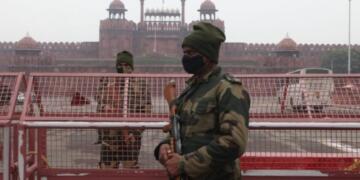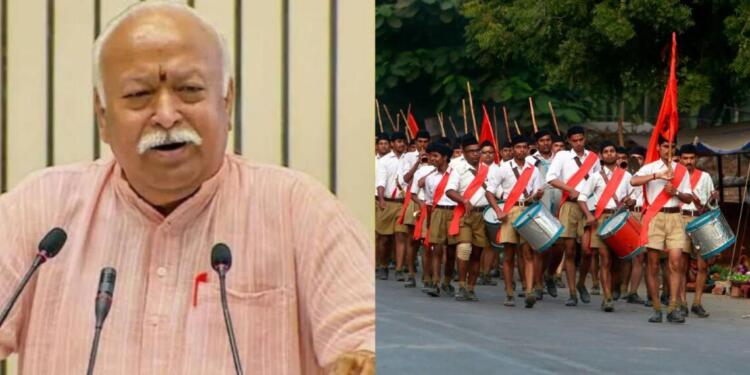As the Bharatiya Janata Party (BJP) prepares to elect its new national president, the Rashtriya Swayamsevak Sangh (RSS) is set to conduct its crucial annual Prant Pracharak Baithak in Delhi from July 4 to 6. The synchrony of these two significant events is no coincidence. The RSS, plays an undeniable role in shaping the ideological and organisational landscape of the BJP. With both meetings taking place in the national capital within the same week, it reflects an alignment to ensure that the saffron family remains unified, ideologically cohesive, and prepared for upcoming electoral and organisational challenges, including the 2029 Lok Sabha elections and crucial state polls.
RSS Baithak: Laying the Groundwork for the Centenary Year
The RSS will hold its annual national-level Prant Pracharak meeting at its Delhi headquarters, Keshav Kunj, bringing together top functionaries including RSS chief Mohan Bhagwat, Sarkaryawah Dattatreya Hosabale, and other key Sah-Sarkaryawahs. Scheduled from July 4 to 6, this baithak will focus on reviewing training activities conducted over the past few months and finalising execution plans for the Sangh’s centenary celebrations, which will begin on Vijayadashami (October 2, 2025) and run till October 2026.
Akhil Bharatiya Prachar Pramukh Sunil Ambekar confirmed that the meeting will see participation from all Prant and Kshetra Pracharaks, Sah-Pracharaks, and heads of various organisational departments. One key agenda is planning the national tour of Mohan Bhagwat for the year 2025-26 and reviewing allied organisations’ preparations for the centenary year.
BJP President Election: A Tradition of Consensus
While the RSS gears up for internal strategy, the BJP is inching closer to finalising its next national president. Party sources suggest the announcement may be made by early July. Currently, Union Health Minister JP Nadda holds the post, serving a second extended term.
The BJP’s internal constitution mandates that a central election team be formed to oversee the selection, with a strong preference for consensus. Unlike other parties, the BJP’s leadership transitions rarely see contested elections. Instead, senior leaders arrive at a consensus, often factoring in informal consultations with the RSS leadership. With organisational elections nearing completion across states, the stage is set for the big reveal before the monsoon session begins on July 21.
Why the RSS Baithak Matters
The RSS’s Prant Pracharak Baithak is not just an administrative event; it is where the ideological engine of the Sangh Parivar refuels and recalibrates. These meetings serve as a pulse check for the organisation and help formulate responses to socio-political developments.
Discussions range from upcoming programmes and community outreach to rural penetration and cadre-building. The 2025 baithak is particularly significant as it comes ahead of the centenary celebrations, with expectations of a year-long nationwide campaign promoting the Sangh’s ideals and legacy. Mohan Bhagwat’s tour calendar will also be finalised to maximise visibility and outreach.
The Prant Pracharak Baithak in Delhi is also expected to feature internal discussions on the BJP’s new national president selection. While the RSS does not officially intervene in political matters, its inputs are often considered crucial in shaping consensus within the party’s leadership and broader organisational direction.
The RSS at 100: Legacy and Looking Ahead
Founded in 1925 by Dr Keshav Baliram Hedgewar in Nagpur, the RSS has grown into one of the world’s largest voluntary organisations. With lakhs of Swayamsevaks (volunteers) and a presence across India, the RSS has been instrumental in shaping nationalist thought and socio-cultural movements.
Its influence extends into several sectors, including education, labour, media, and of course, politics via the BJP. As it approaches its centenary year, the Sangh is preparing for major events to reflect on its journey and chart the path forward. Activities will begin from Vijayadashami 2025, including mass mobilisation, seminars, historical retrospectives, and spiritual gatherings.
Upcoming Plans and Coordinated Strategy
The RSS has conducted training sessions nationwide in April, May, and June 2025, preparing cadres for the centenary celebrations. Coordination with allied organisations like ABVP, BMS, VHP, and Seva Bharati will be enhanced. The centenary year is expected to be a pivotal moment not just for the RSS but for the larger saffron ecosystem, aligning cultural nationalism with electoral mobilisation.
Two Bodies, One Ideological Heartbeat
While the RSS does not directly interfere in political affairs, its ideological sway over the BJP is well documented. The alignment of its baithak with the BJP’s leadership transition reflects a deeper synchronisation between cultural and political Hindutva. As the BJP selects its new president and the RSS gears up for its 100th year, the two are set to walk in lockstep towards a shared vision for India’s future.
The next few weeks will thus not just shape the party’s leadership, but could very well recalibrate the ideological messaging for the years ahead.























